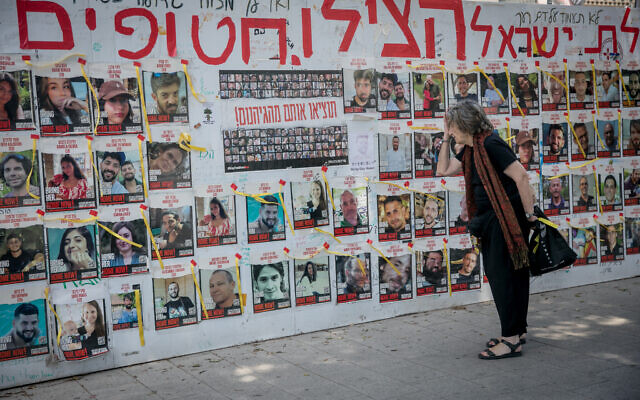



Amid intensive US efforts to achieve a deal for the release of hostages in Gaza in exchange for a truce, both Israeli and Palestinian officials tempered optimism on Monday around progress in Cairo talks.
Hamas rejected the latest Israeli ceasefire proposal, senior official Ali Baraka told Reuters.
“There is no change in the position of the occupation (Israel) and therefore, there is nothing new in the Cairo talks,” a different Hamas official, who asked not to be identified, told Reuters earlier. “There is no progress yet.”
A Palestinian official close to mediation efforts said the deadlock continued over Israel’s refusal to end the war, withdraw forces from Gaza, allow all civilians to return to their homes, and lift a 17-year-old blockade to allow speedy reconstruction of the coastal enclave.
These steps took precedence over Israel’s prime demand for a release of hostages in exchange for Palestinians held in Israeli prisons, said the official, speaking on condition of anonymity. “Regarding the exchange of prisoners, Hamas was and is willing to be more flexible, but there is no flexibility over our…main demands,” he said.
Meanwhile, an Israeli official told The Times of Israel that there are still significant gaps.
Hamas has not issued a list of the prisoners it wants released, and Israel has not sent a list of who it is willing to let go, in a potential deal.
The current discussions are focused on resolving disagreements over the return to northern Gaza of civilians who were displaced to the south during the Israeli offensive aimed at destroying Hamas and freeing the hostages. Prime Minister Benjamin Netanyahu has vowed to see the war through until Hamas is destroyed.
The official noted it is clear that Hamas leader Yahya Sinwar feels like he is in a strong position.
According to alleged details of a deal proposed by the United States that were reported by several media outlets Monday, Israel is willing to show flexibility on the return of Gazans to the northern Strip without having to undergo Israeli security checks.
The Kan public broadcaster reported that IDF forces would remain 500 yards from approved routes to the north.
The US is applying significant pressure on Qatar to push Hamas toward accepting a deal, according to Hebrew media reports. But Israel feels Qatar is not doing enough to get Hamas to change its demands, and sees Egypt as the preferred mediator, an Israeli official told The Times of Israel on Monday.
The deal under discussion would also call for the release of 40 Israeli captives held in the Gaza Strip in return for a temporary truce and the release of hundreds of Palestinian security prisoners, including some convicted of deadly attacks.
The deal would also include a marked increase in humanitarian aid deliveries to Gaza.
It is believed that 129 hostages are still held in Gaza of the 253 abducted on October 7, when thousands of Hamas-led terrorists burst across the border into Israel, killing some 1,200 people, mostly civilians, and committing wholesale atrocities including sexual assault.
Hostage deal negotiators are currently waiting for Hamas to respond to the latest proposal brokered over the weekend in Cairo, White House National Security Council spokesperson John Kirby said, without going into details of what was in the proposal.
Kirby confirmed that CIA chief William Burns was in Cairo leading the US negotiating team in the talks, which are also being brokered by Qatar and Egypt.
“We are waiting for Hamas leader Yahya Sinwar’s response. It could take a few days,” Kirby said.
Speaking to the Qatari-owned Al-Araby Al-Jadeed news outlet, Egyptian sources said the proposal does not include a commitment to a permanent ceasefire, which Hamas has insisted is a nonnegotiable item, and which Israel has dismissed, along with other demands from the terror group, as “delusional.”
Netanyahu on Monday said a date has been set for an offensive into the southern city of Rafah, the last Hamas stronghold in Gaza, in a statement that could also be construed as an attempt to apply pressure on Hamas to temper its demands.
Negotiators are also reviewing the option of observing an initial three-day truce, with no other obligations, over the three-day Eid al-Fitr holiday, which marks the end of Ramadan later this week.
The Axios website also reported that 40 hostages would be freed in the deal, citing three unnamed Israeli officials.
According to that report, Israel would release 700 Palestinian security prisoners, including more than 100 who are serving life for attacks that killed Israelis.
The officials said that Hamas has been told to provide a list of 40 living hostages that it will release in the deal, and to compromise on the number and identity of Palestinian prisoners it wants in return.
Israel, for its part, would have to compromise in allowing the return of displaced Palestinians to the northern Gaza Strip. The movement of Gazans back to the north has become one of the key elements of negotiations, with both sides previously digging in on their respective stances.
Hamas is demanding that Israel withdraw its forces from a land corridor connecting the northern and southern regions of Gaza to enable movement between the two, Axios reported.
Israel was said to insist that soldiers remain at the corridor and that those passing through undergo inspection to ensure they are not Hamas members.
One of the Israeli officials told Axios that Jerusalem had also agreed to another compromise related to the return of displaced Palestinians, without giving further details.
Israel’s security cabinet is set to meet on Tuesday night to discuss the latest proposal.
Channel 12 reported that Hamas claims it would not be able to free 40 hostages who are women, children, elderly or sick. The station noted that Hamas made the same claim during talks that produced a November week-long truce that included the release of more than 100 hostages.
Channel 12 also reported, without citing sources, that there is criticism within the IDF of the emerging deal, as the recent withdrawal from the city of Khan Younis and an increase in aid deliveries will take pressure off Hamas, to the advantage of Sinwar.
The Kan public broadcaster also cited unnamed Israeli officials as lamenting that Hamas is making gains on its demands for an Israeli withdrawal from Gaza, along with more aid deliveries, but without yet providing Israel anything in return.
Channel 13 cited a senior Israeli official as saying that the US proposal includes Hamas providing a full list of living hostages.
A total of 105 civilians were released from Hamas captivity during a weeklong truce in late November, and four hostages were released prior to that. Three hostages have been rescued by troops alive, and the bodies of 12 hostages have also been recovered, including three mistakenly killed by the military.
The IDF has confirmed the deaths of 34 of those still held by Hamas, citing intelligence and findings obtained by troops operating in Gaza. One more person has been listed as missing since October 7, and their fate is still unknown.





